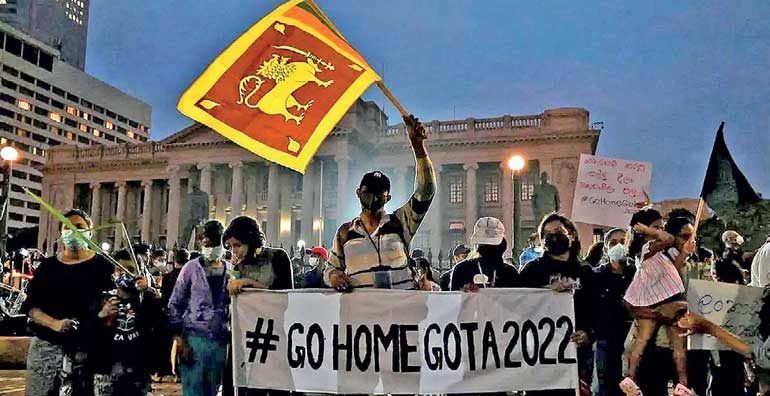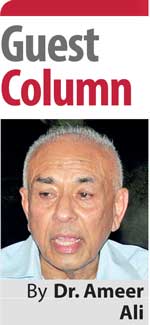Tuesday Feb 17, 2026
Tuesday Feb 17, 2026
Tuesday, 2 August 2022 03:25 - - {{hitsCtrl.values.hits}}

 By promoting himself as the guardian angel of Buddhism and the Sasana, former president Gotabaya Rajapaksa fooled the Sangha and the Buddhist community, surrounded himself with a bunch of military strongmen, self-promoting pseudo-experts and advisers, and led the country along a destructive path of development, which produced at the end a failed state with a bankrupt treasury and a paralysed economy. Yet, the end of that tumultuous Gotaucracy, thanks to the Aragalaya generation, had not provided the people who voted GR to power another opportunity to choose a new leader.
By promoting himself as the guardian angel of Buddhism and the Sasana, former president Gotabaya Rajapaksa fooled the Sangha and the Buddhist community, surrounded himself with a bunch of military strongmen, self-promoting pseudo-experts and advisers, and led the country along a destructive path of development, which produced at the end a failed state with a bankrupt treasury and a paralysed economy. Yet, the end of that tumultuous Gotaucracy, thanks to the Aragalaya generation, had not provided the people who voted GR to power another opportunity to choose a new leader.
Instead, that opportunity was given to the 225 parliamentarians – on whom the Aragalayists had already passed a symbolic vote of no confidence – and those faction driven 225 installed at the end Ranil Wickremesinghe aka Ranil Rajapaksa (RW/RR) as the substitute president. It is a strange irony in Sri Lanka’s post-independence history that a person who was rejected by popular vote at a general election entered the legislature through one backdoor, became an acting prime minister through a second and eventually captured the presidency through a third.
While the Aragalayists demand this backdoor specialist to resign and go home, the Rajapaksa faction that installed him and Rajapaksa backers outside the Parliament want the nation to give their nominee a chance to liberate the country’s economy from its current state of insolvency. While sitting in the opposition at the start before elevated as Prime Minister, RW/RR promoted himself as the messiah sent to bring deliverance to the nation’s economic agony. He also revealed that his proposed deliverance would come through an early approach to the IMF. Behind that approach was his plan to implement certain stock-in-trade macroeconomic and monetary remedies.
IMF has already spelt out what they would be. However, the real issue facing the economy goes much deeper than macroeconomic reforms, debt restructuring and institutional improvements. In fact, that issue had already been understood and succinctly presented by the Aragalayists in their two-word demand for ‘systemic change’! This demand was side stepped by RW/RR even when he promised to protect Aragalaya’s epicentre of protest, the Galle Face Green, in the wake of violence unleashed upon the youngsters by the former Prime Minister Mahinda Rajapaksa. To RW/RR systemic change simply meant fine tuning with stronger variables the existing political, economic and social structures.
However, even that fine tuning is going to face a rocky road, partly because of the additional pain associated with macroeconomic remedies, especially on low-income groups, and partly because of a deteriorating economic environment bordering recession internationally. Rapidly rising inflation, tight monetary policies and war driven scarcities internationally would add to the pain inflicted by IMF driven economic reforms. On top of these, is the resurgence of the pandemic after a short respite. Already, IMF has asked Sri Lanka to negotiate with its respective lenders like China for example, before approaching IMF for restructuring debt. In fact, the IMF program has got entangled with Sri Lanka’s foreign policy debacle. The soon to arrive China’s “scientific research” vessel in Hambantota Harbour has raised the ire of India and Western powers. Unless this is resolved amicably and to the satisfaction of India and US, flow of IMF assistance may not be as smooth as it appeared at the beginning.
Therefore, the task of rebuilding Sri Lanka’s open economy in the next two years is going to be extraordinarily challenging. An open revolt against tough reforms is therefore unavoidable, and Aragalayists are destined to lead that revolt with or without the support of opposition parties. It is in the expectation of such turn of events that the new president, who holds the ministries of defence and finance, had got the emergency proclamation passed by a Rajapaksa-controlled legislature. Already, the image of young protestors is being tarnished as fascists and extremists. Their movements are under surveillance. They are tracked down, monitored, arrested and, if social media information is true, even made to disappear. Is the nation about to witness the rebirth of the infamous white van culture?
The proposed all-party government is not going to solve any of the problems except to reward those who jumped ship to protect RW/RR, with new positions. That government would be old wine in new bottle. The proposed macroeconomic reforms, emergency regulations and an all-party government are therefore complementary instruments to create a new autocracy under RW/RR. This in fact, seems to be the president’s response to those who demand systemic change. The tri-forces, an immensely costly and unaffordable legacy of the civil war, which ended 13 years ago, would be employed if necessary to protect that autocracy. It is therefore vital that Aragalaya should continue with its historic mission to bring about systemic change.
As mentioned in a previous contribution this has turned out to be an inter-generational battle between an awakened youthful component on the one hand, which wants an inclusive Sri Lanka with democratic freedom, honest governance, human dignity and cultural heterogeneity; and on the other, an ageing counterpart that had been brought up in an ethnocentric political milieu, with corruption ridden economy, slavish public institutions and a homogenising cultural mission, all under a pernicious hegemonic ideology. It is this system that is threatened by the new generation.
RW/RR’s rearguard attempt to suppress Aragalaya with emergency regulations would be counterproductive. Even IMF, besides other world agencies, seems to feel concerned about the president’s political intentions and resulting instability. True, IMF helped Sri Lanka 16 times previously between 1965 and 2000. But the current crisis is qualitatively different and financially more onerous. It therefore requires more than the usual remedies of macroeconomic reforms with emergency funding. Unfortunately, the situation is also coinciding with a depressive global economic environment, which is about to enter another recession.
To make systemic change a reality, it requires a fresh mandate from the people either through massive popular revolt or ballot box. With the voting strength of Aragalaya generation is said to be statistically deterministic, an election is the safe option. This is why the JVP/NPP leader’s urge for an immediate election needs to be supported. Before that, Aragalayists themselves need to do some homework to convince ordinary voters island-wide of the need for and benefits of systemic change.
However, the new political missionaries should be particularly aware of exploiters and highjackers. It is worth recalling how the Iranian mass protest against the Shah in 1979 was exploited and later hijacked by the mullahs who at the end produced an equally repressive regime but with a religious garb. It was the same story in Egypt before the protestors as well as Brotherhood highjackers were both massacred by the army to restore the ancient regime. History may not repeat but rhymes, as Mark Twain said.
(The writer is attached to Murdoch Business School, Murdoch University, Western Australia.)